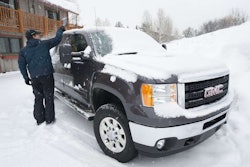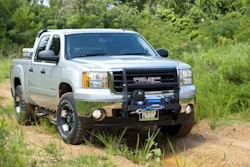Wiring Done Right
Forget using the black electrical tape – do it like a pro
By Tom Jackson
 When I see common black electrical tape hanging next to the wiring materials in the auto parts store it makes me scratch my head in wonder: You’ve got to be nuts to use black electrical tape on any automotive wiring job. Home, yes. Vehicle, no.
When I see common black electrical tape hanging next to the wiring materials in the auto parts store it makes me scratch my head in wonder: You’ve got to be nuts to use black electrical tape on any automotive wiring job. Home, yes. Vehicle, no.
 Heat causes the adhesive in electrical tape to soften and the tape looses its grip. That’s not a problem in home wiring, but under the hood of a truck or even outside the engine bay on a hot day, the wire being held by that plastic tape is going to unravel or the connection come apart.
Heat causes the adhesive in electrical tape to soften and the tape looses its grip. That’s not a problem in home wiring, but under the hood of a truck or even outside the engine bay on a hot day, the wire being held by that plastic tape is going to unravel or the connection come apart.
Professional service techs know better. They take extra care to splice wires in any automotive application so the connections will withstand all the vibration, heat, water and abuse you can throw at them.
 If you’re dealing with stranded wire, and most automotive wiring is stranded, the best joints are made with solder and then covered with heat-shrink tubing. Simply strip off about an inch of insulation from both wires, twist the strands tightly on each end, and slip the heat-shrink over one end.
If you’re dealing with stranded wire, and most automotive wiring is stranded, the best joints are made with solder and then covered with heat-shrink tubing. Simply strip off about an inch of insulation from both wires, twist the strands tightly on each end, and slip the heat-shrink over one end.
Now fire up the soldering iron or butane torch. Bend each exposed wire end into a “J”-shape, hook them together and twist tight. Then warm up the wire and drizzle solder into the joint.
(The solder not only gives you 100 percent connectivity, but it affords decent mechanical strength as well.)
The last step: Slide the heat shrink tubing over the joint and gently heat the tubing with the torch, taking care not to light up anything else. The connection is both sealed and strong.
Butt connectors are a second-tier alternative best reserved for solid wire instead of stranded wire. However, if that’s what you must use, always double crimp. To do it right requires a double crimping tool, which you can buy for less than $10 at most auto supply stores.
OTHER CONNECTORS
Wire “taps” save you the time of having to strip wires and solder or crimp. But they have some drawbacks when it comes to pickups used in the construction world.
 Even the most basic of wiring tools and materials can produce professional-quality results when used in the right manner.
Even the most basic of wiring tools and materials can produce professional-quality results when used in the right manner.
Such taps “bite” into two opposing wires with a set of metal teeth that form the electrical connection between the two wires. While these form a strong mechanical connection, the devices themselves don’t seal out moisture and will eventually lead to some corrosion and continuity problems.
Self-fusing auto tape (a.k.a., self-fusing silicone tape) can be used to make insulated, waterproof connections in electrical wire joints. It doesn’t offer great mechanical strength so a soldered or crimped joint may be necessary.
But unlike traditional electrical tape, self-fusing tape bonds to itself to form a solid seal and it isn’t affected by heat or all the other harsh conditions in a vehicle.
Liquid tape is also a good sealer, insulator and protector and has the advantage of being brushed on. That’s nice for alternator leads, trailer plugs, auxiliary lights and other places where a wire connects to an exposed metal stud or ground.
MORE WIRING TIPS
If you’re joining two wiring harnesses, putting in new bulbs, or doing any electrical upgrades/service that snaps in place, I recommend you hit the joint with a squirt of dielectric grease.
This clear grease seals out moisture and it’s electrically conductive to keep the current flowing freely.
When wiring auxiliary lights such as driving, fog or work lights, always use a relay. A relay allows you to connect a low-amp circuit, such as the switch on your dash, to a high-amp-draw accessory without burning up the switch.
Relays should be mounted under the hood so the heavier-gauge wires from the battery (or other power source) to the accessory are outside of the cab. (Check out propickupmag.com to see light relay wiring diagrams if you need help.)
If your local auto parts store doesn’t have the electrical connectors or other wiring supplies you need, check out these websites:







